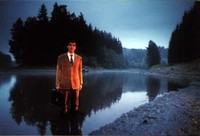Austria's Waldeck- Don't Call Me Kruder Or Dorfmeister
Author: Jonty Adderley
Wednesday, April 2, 2003

Specialising in high quality, downtempo, electronic music, softly spoken Austrian producer Klaus Waldeck is the first to admit he shares some common features with his country's best known electronic duo, though he's equally clear on what sets them apart.
"Those guys tend to be very focused on their own projects. They co-produced my first EP Northern Lights then suddenly the contact broke up. I occasionally see them when they DJ but there's no close relationship there. People sometimes compare my music to theirs, too but I'm trying to produce songs rather than tracks and they're more into tracks."
Evidence of how song based Waldeck is comes on his new remix album Reflowered, a collection of other people's versions of his acclaimed recnt album The Night Garden. Tuneful, accessible and highly immediate, it's a fine collection of deeply soulful tunes bearing comparison with the likes of (early) Massive Attack, Portishead or more recent contenders like Bent. The trip hop connection makes sense since he spent several years in the mid 90s immersed in London's trip hop scene, where he met current vocalists Joy Malcolm (ex of Incognito) and Brian Amos. However, he's adamant his music shouldn't be labelled 'chill-out'.
"The problem with chill-out as a term is that it sometimes carries negative connotations," he told Skrufff's Jonty Adderley.
"But when it comes down to it, I don't have a problem with it being regarded as a chill-out or smoking album."
Skrufff (Jonty Adderley): Reflowered is a remixed version of last year's album The Night Album, did you always intend to do a remix version-
Waldeck: "Yes, I had it in my mind for a long time because it's something that often arises with electronic music because you always end up with additional versions. Frequently those versions turn out nicely, but you can't use them all."
Skrufff: Did you give much specific direction to the remixers-
Waldeck: "Errm, not really my only real input was in selecting who did them. I had more remixes than I used in the end so I didn't use them all. Even though it's a remix album it still needs to stand as an album."
Skrufff: You covered David Bowie's Cat People track on the original album, were you a big Bowie fan-
Waldeck: "The story behind that track is that I always felt the original song had a really cool beginning with an incredible vibe, then it turned into a classic 80s pop song which I liked, but I always felt particularly intrigued by its beginning and felt it could make a good dance track. It has a very dirty, deep, dubby atmosphere and that's what interested me."
Skrufff: When you're creating your music and the album are you looking at the UK or Germany or anywhere else-
Waldeck: "The first real success I had was in France with my first album. The record company sold around 20,000 copies of my album there, which is not amazing but it's the reason why I'm still doing music. It was all down to one employee at the record company who was doing an apprenticeship and he became really obsessed with the music. He worked in the label's jazz department and he started calling up journalists asking 'Do you like the album-' If they said 'No' he'd go 'Ah, then listen again' (chuckling) then call back three days later. He was really enthusiastic and he's basically the reason I'm still doing music. Because I thought if I can sell records in France without even being based there, I've got good potential. French people are often very nationalistic about what they play."
Skrufff: When you play live you perform behind a screen, why-
Waldeck: "We do that because I think my music is more listening music and what we have on stage is effectively a living room behind a screen. I wanted to bring that ide Tags

